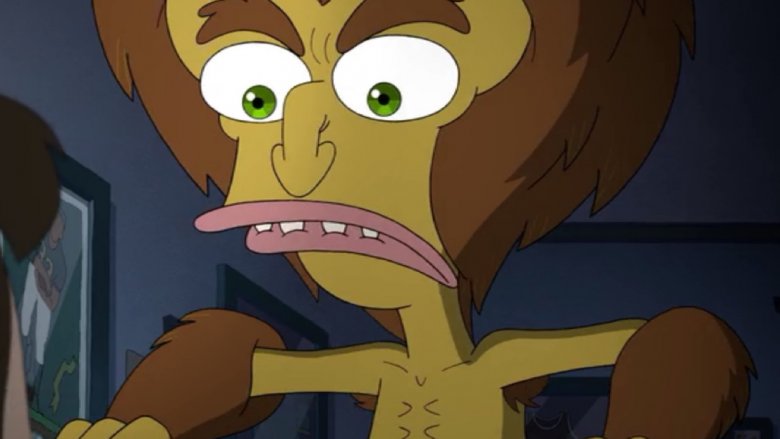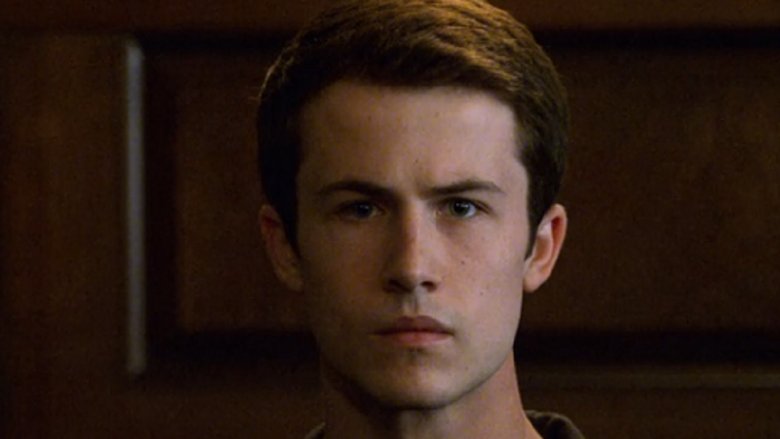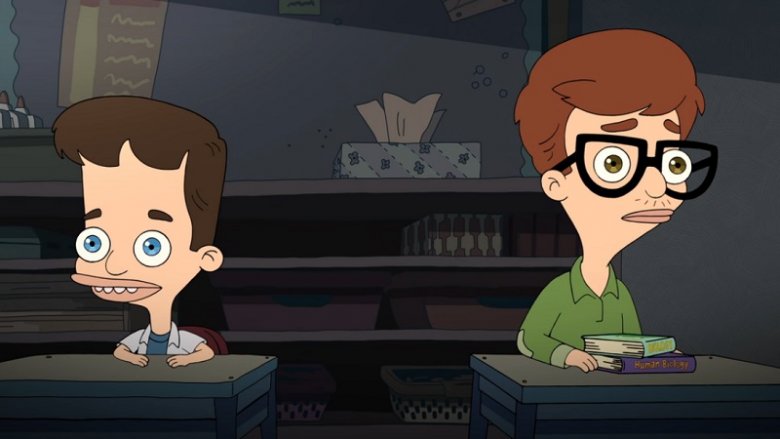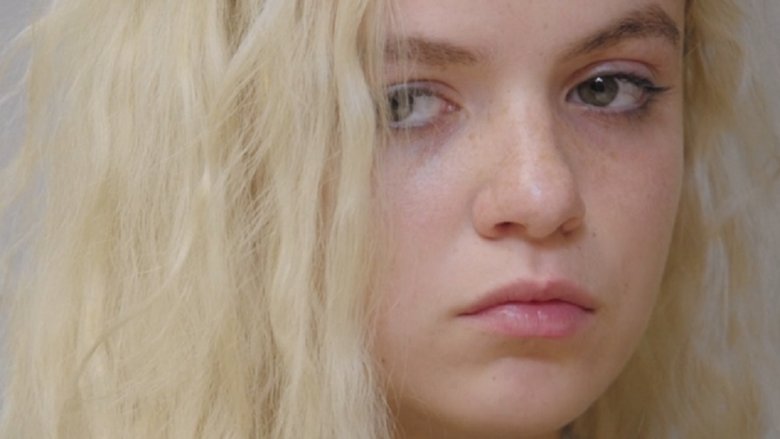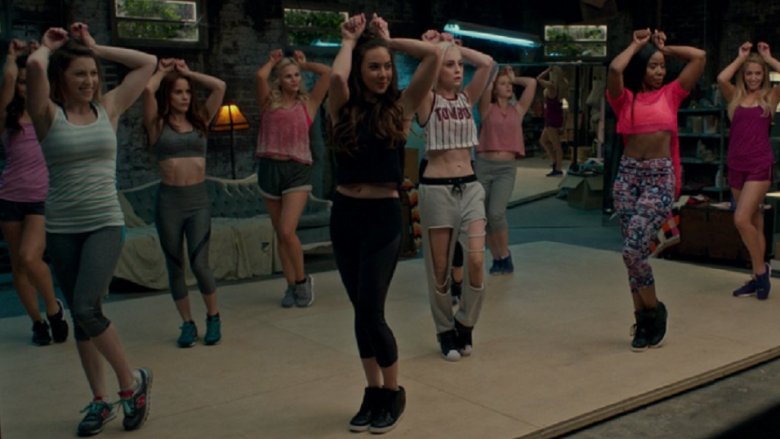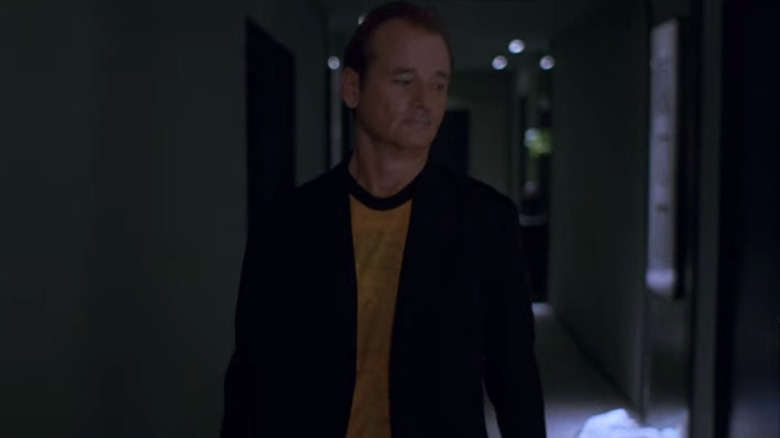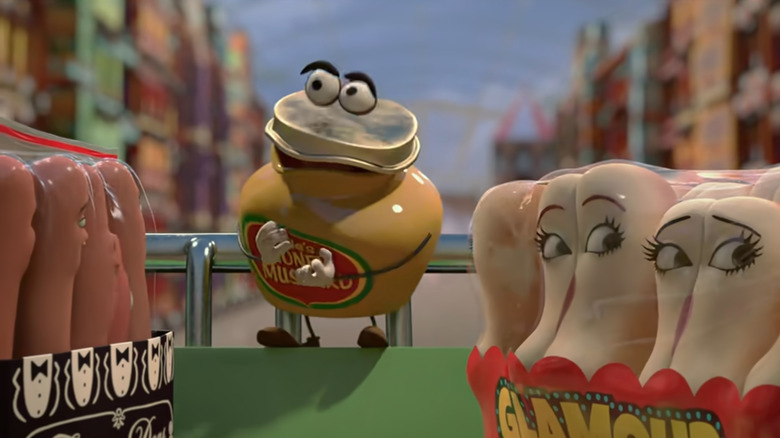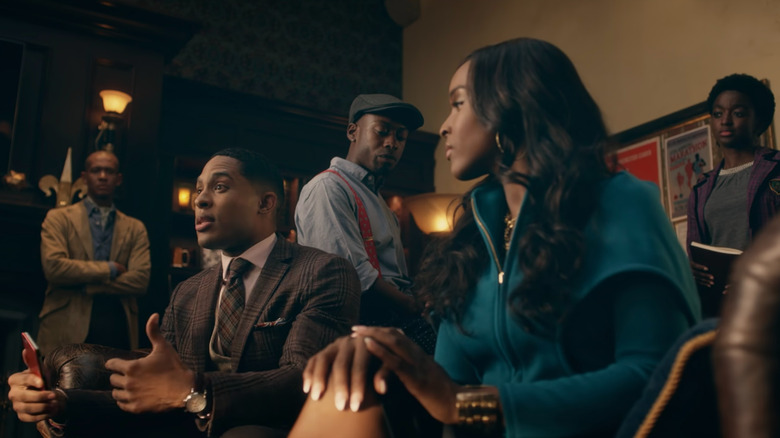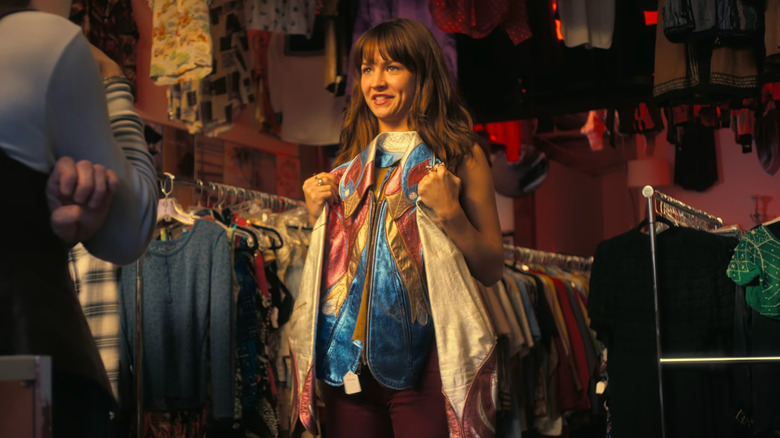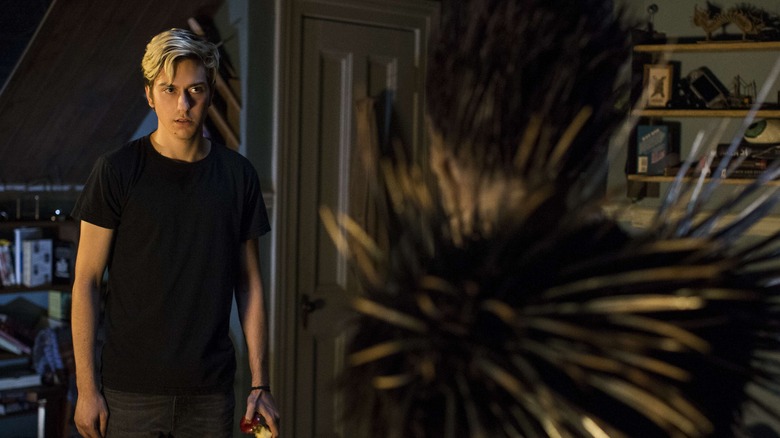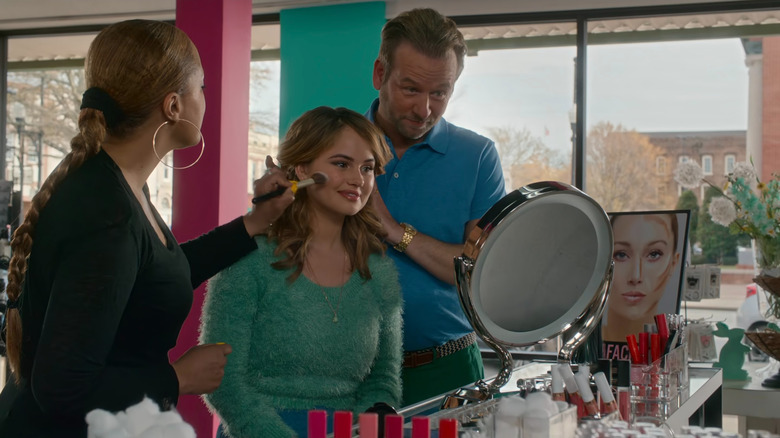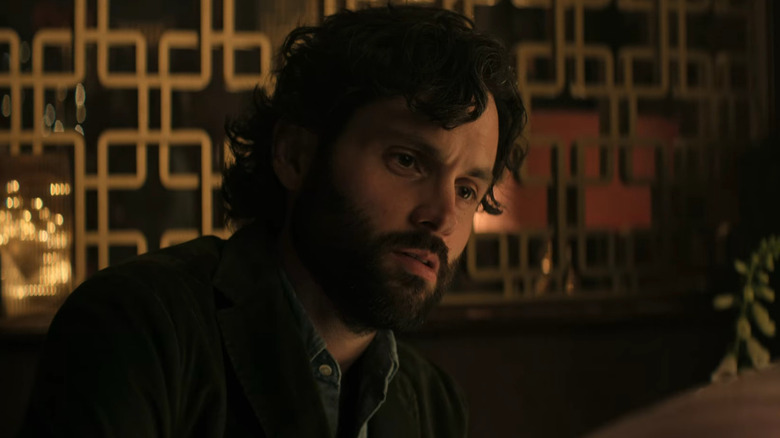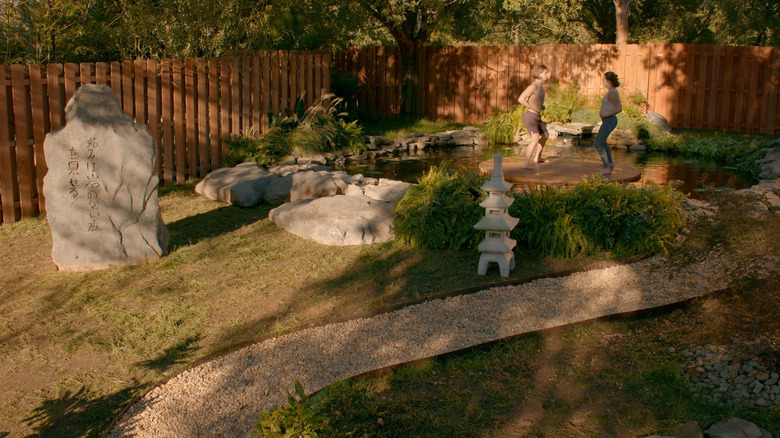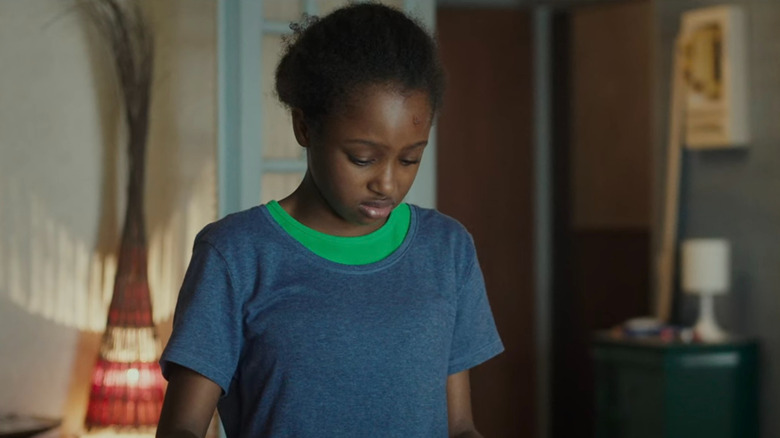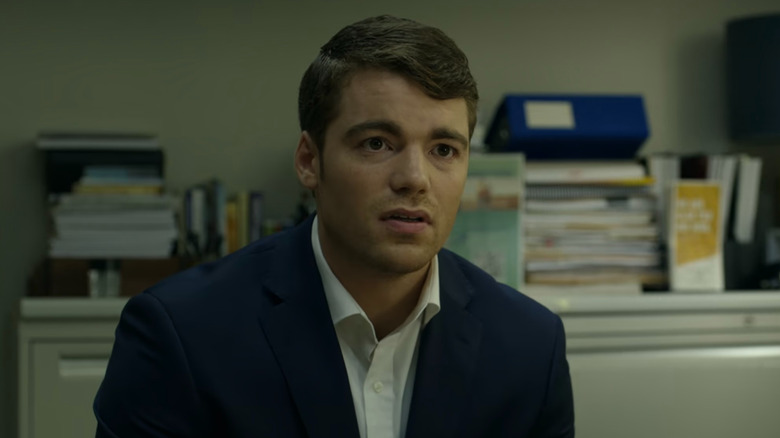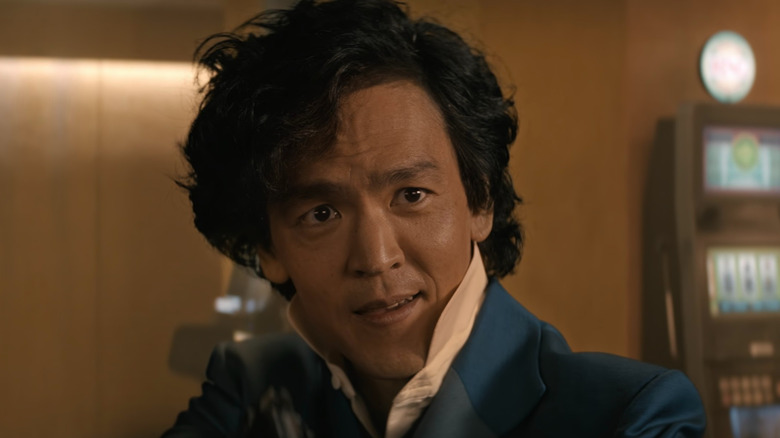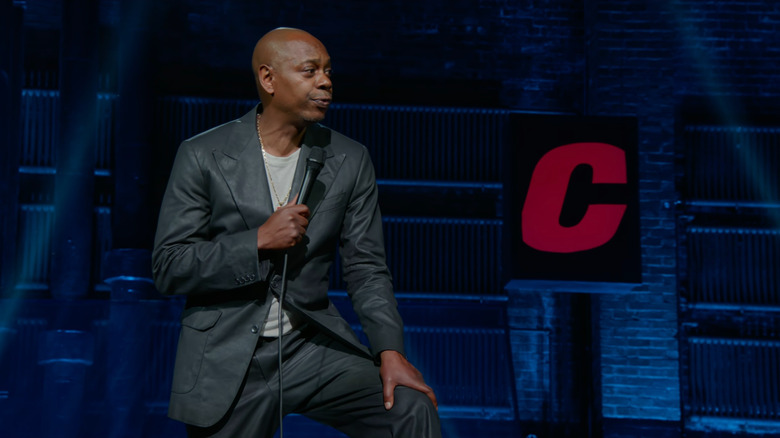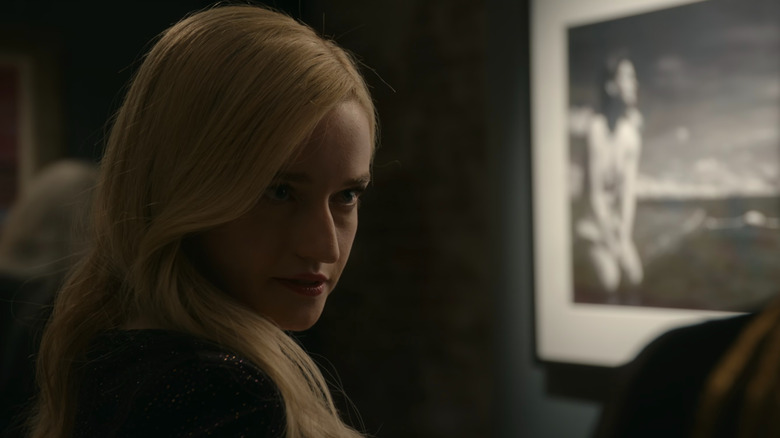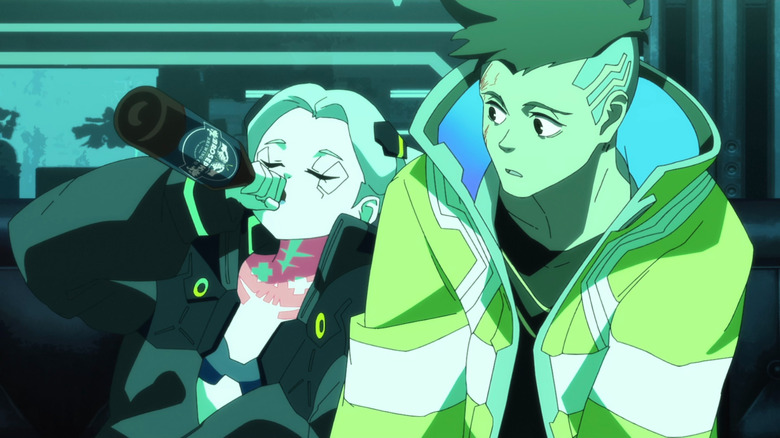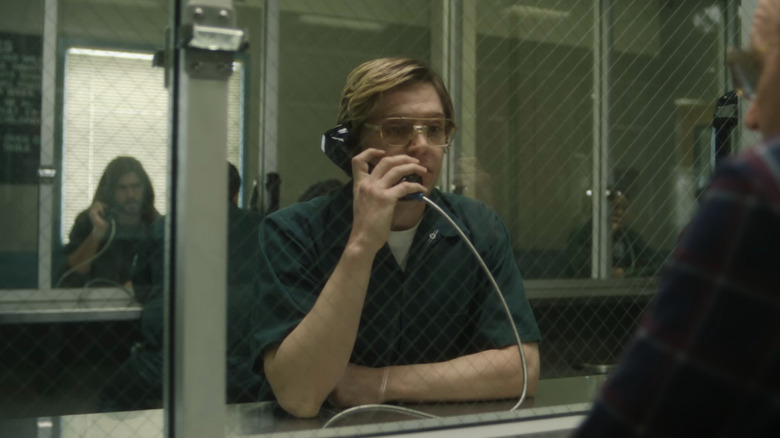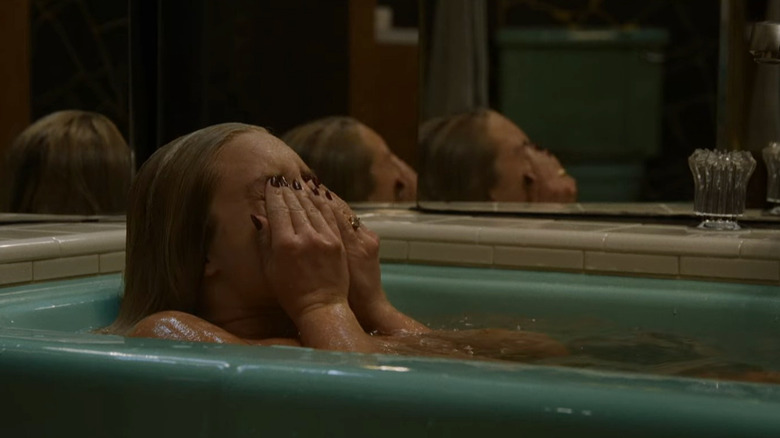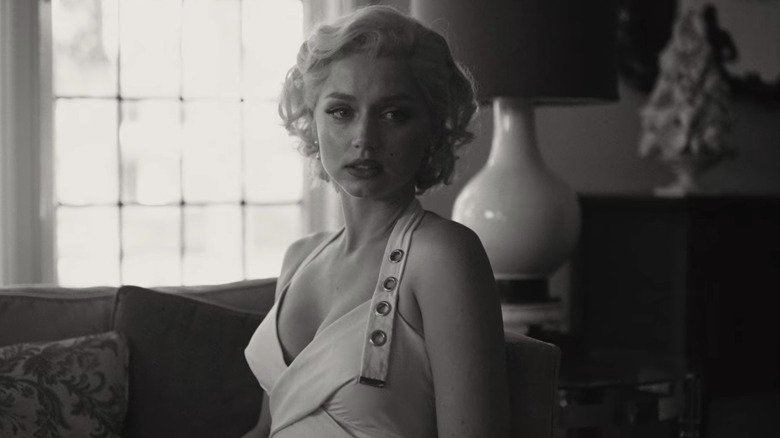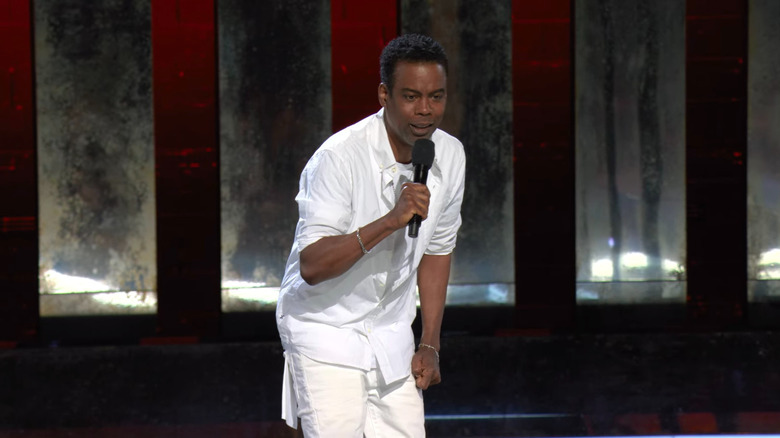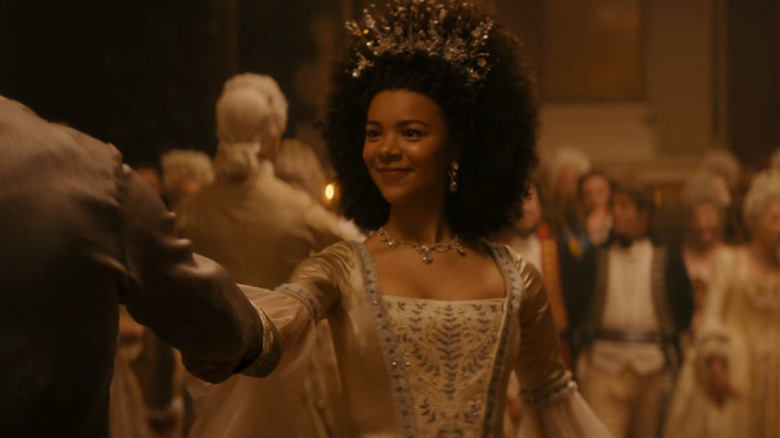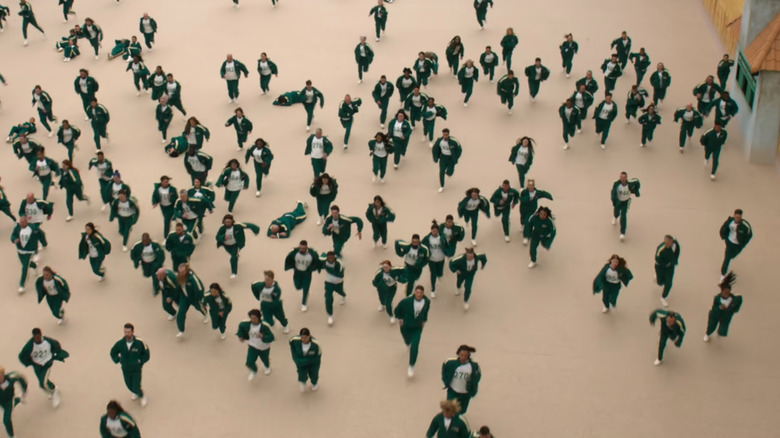Netflix's Most Controversial Movies And TV Shows
Netflix has rapidly become a ubiquitous part of nearly all of our lives, with its incredibly deep, constantly shifting streaming catalog of movies and television series. Usually, the phrase "there's something for everyone" is mere hyperbole — but not in the case of Netflix, which quite literally has something for you whether you're a fan of extreme horror, an actual toddler, or anything in between.
Of course, with such an extensive selection, there's bound to be some content that's a bit problematic. Whether it's the material itself, the situation surrounding its production, or moments that could be seen as inappropriate, Netflix has put up a surprising amount of material that's drawn controversy for one reason or another. From arthouse films to mainstream theatrical releases to the company's own rapidly expanding library of original movies and series, here's a look at some of the most controversial viewing experiences Netflix has to offer.
13 Reasons Why
The Netflix original series "13 Reasons Why" debuted in 2017, and immediately became a lightning rod for controversy. The story picks up after the suicide of high schooler Hannah Baker (Katherine Langford), who left behind a series of cassette tapes meant for specific people in her life, detailing the reasons for her decision. Through the use of flashbacks, the season depicts disturbing instances of sexual assault, bullying, and — in a scene that some observers found to be irresponsible and potentially dangerous for impressionable teens — Hannah's graphic suicide.
Despite its seemingly self-contained premise, the series was picked up for another season, and its release brought a fresh round of controversy in 2018. Its more problematic scenes include an explicit depiction of a young man's sexual assault by another man, an incident that nearly prompts a school shooting. Creator Brian Yorkey defended the scene as necessary to sparking dialogue, while Netflix CEO Reed Hastings took a decidedly less compromising "if you don't like it, you don't have to watch it" stance. To its credit, Netflix added warnings before every episode and launched a companion series, "Behind the Reasons," to encourage discussions of the issues the show presents — none of which have stopped some from labeling it mere exploitation. Despite season 2 slipping considerably in the critical acclaim department, the series was renewed for a third and fourth season.
Big Mouth
Netflix has generally fared quite well with its original animated offerings, with titles like "BoJack Horseman" and "F is for Family" soaking up critical acclaim despite (or perhaps because of) their adult themes and humor. But with Big Mouth, they took a considerable risk. An examination of puberty and teen sex, the show leans heavily on vulgarity and gross-out humor — and while some critics have found it to be sharp, funny, and engaging, others have deemed its utter commitment to nastiness a bridge too far.
The criticism ranges from supposed confusion over whether the show is aimed at children (it's obviously not, which creator Nick Kroll has spelled out more than once) to its alleged "liberal agenda" and sideways references to homosexuality and pedophilia. The series has also managed to draw fire from the other end of the political spectrum for one addition to its stellar voice ensemble: Jenny Slate, a white actress cast as the voice of a black character. (The show has since acknowledged its mistake, and recast the character of Missy with "The Bear" star Ayo Edebiri at the end of the fourth season.)
White Girl
Writer/director Elizabeth Wood leaned on a couple of very specific influences for her 2016 indie film "White Girl": writer Harmony Korine and director Larry Clark's 1995 provocative "Kids," and her own past as a hard-partying girl from the Midwest attending college in New York. More than a few comparisons have been made between her film and Clark's work, and the films even share a producer in Christine Vachon — but "White Girl" is slightly more concerned with matters of power and control, particularly in the way fresh-faced protagonist Leah (Morgan Saylor) finds her grasp on both slipping as she delves deeper into a lifestyle of illicit drugs and casual sex.
After the film's debut at Sundance, it was savaged by Variety in a review that basically accused Wood of playing to the exploitation crowd to shoulder her way into Hollywood. Of course, "Kids" — which is today considered a highly influential work — received its share of similar criticism upon its release. In a Vogue interview, Wood responded to such appraisals succinctly, saying, "It's interesting to me that sexuality upsets people more than talking about race, or privilege, or gender."
Atypical
Building a wacky sitcom around a main character with autism is nothing if not tricky, and the Netflix original series "Atypical" manages to have its heart in the right place while seemingly hitting every stumbling block along the way. It can be forgiven for failing to put together a complete and accurate picture of the condition, as there are far too many variations along the spectrum for one character to embody them all — but some have taken the show to task for attempting to play up the condition for laughs, while failing to be insightful ... or funny.
The comedy focuses on teenager Sam Gardner (Keir Gilchrist) and his family, and many reviewers — including several on the autism spectrum themselves — have slapped the show with labels ranging from "stereotypical" to "offensive." Even a strong supporting cast including veteran actors Jennifer Jason Leigh and Michael Rapaport as Sam's put-upon parents can't paper over what has been seen as troublesome writing, which has drawn attention for the fact that creator Robia Rashid and her team failed to consult any actual autistic people in bringing "Atypical" to the screen. But the series seems to have found its fans among viewers, ultimately running for four seasons on the streamer.
Step Sisters
"Dear White People" has been a solid hit for Netflix, so the streaming giant's acquisition of "Step Sisters" — a topical exploration of race on college campuses from writer Chuck Hayward along with "Master of None" scribe Lena Waithe — seemed like a no-brainer. But the movie's central premise (a Black college senior is tasked with teaching a bunch of disgraced white sorority sisters to step) sparked controversy before it even debuted, and it hasn't abated.
The film's creators (who are both Black) have taken issue with its being pigeonholed as a "cultural appropriation comedy," with Waithe pointing out that it has a high degree of self-awareness and that "culture is meant to be appreciated and explored by everyone." Of course, many critics have also panned the film for the more conventional crimes of awkward plotting, recycled tropes, and dull dialogue, alongside the misdemeanors of "eye-rolling tone deafness" and "performative wokeness." But with race relations among the hottest of topics in the United States, it seems unlikely that anyone involved in the production could have failed to foresee the flap that it would cause — even before its pickup by Netflix, star Megalyn Echikunwoke admitted to CBS News that "it's definitely meant to be provocative. It might be offensive to some people."
Lost in Translation
Directed by Sofia Coppola (future helmer of the 2023 critical darling "Priscilla"), "Lost in Translation" has the patina of the sort of harmless, nostalgic romantic comedy you just want to cozy up with like a warm blanket (especially if you can forget everything we've unfortunately learned about Bill Murray in the past few years). The feature has long been criticized, however, for its use of Asian stereotypes for comedic effect.
Nadia Jo of the Stanford Daily called the film "belittling," "degrading," and "crude" in its deliberate othering of Japanese people. For instance, she specifically noted how all of the Japanese women portrayed are service workers, and how those attempting to speak English do so by swapping their Ls and Rs. Coppola responded to the wave of criticism with shock, saying that everything she depicted in the film was based on her own lived experience of Tokyo.
Extreme Makeover: Home Edition
Nobody watches a show like "Extreme Makeover: Home Edition" to be critical. We watch it to feel good about the world, to feel like — even just for an hour — it's possible that a community could come together to make a struggling family's fantasy a reality. So it gives us no pleasure to inform you that, sadly, some of those chosen for an extreme home makeover ultimately wind up in a worse place than they started.
The reality is that thrusting a brand new home onto an unsuspecting family — often one that's much larger and filled with more bells and whistles than their previous one – can result in financial burdens that cash-strapped families can't afford. There's also the matter of the so-called "Tragedy Wishlist," a leaked email chain in which an ABC employee appeared to be seeking out families of individuals with specific rare illnesses to feature on the show. Some critics accused the series of exploiting participants as a consequence.
Forgetting Sarah Marshall
When it first debuted in 2008, there wasn't anything controversial about "Forgetting Sarah Marshall." Aside from the normal amount of raunch one would expect from a Judd Apatow feature, there's not much content to make the film unwatchable — at least, there wasn't until most of the main cast got wrapped up in some of the worst controversies of 2023. We aren't even talking about Kristen Bell, whose arguably way-too-public life is often the subject of scrutiny. We're talking about Russell Brand, Mila Kunis, and Jonah Hill.
In July 2023, Hill came under fire after an ex-girlfriend alleged that the "Superbad" actor had been emotionally abusive, sharing photographs of text messages that the internet poured over for several days. Later that same month, actor Alexa Nikolas accused Hill of sexually assaulting her when she was just 16. Two months later, Kunis and her husband Ashton Kutcher were harshly criticized for writing a letter of support for their friend and former "That '70s Show" castmate Danny Masterson, after the actor was found guilty of raping two women. That same month, The Times UK published the stories of women who alleged Brand had assaulted them years earlier. Suffice it to say, it's understandable if the film stays off your watch list for the time being.
If you or anyone you know has been a victim of sexual assault, help is available. Visit the Rape, Abuse & Incest National Network website or contact RAINN's National Helpline at 1-800-656-HOPE (4673).
Sausage Party
As a decidedly adult take on the Pixar-esque objects-brought-to-life trope, "Sausage Party" is already controversial enough to make it on this list. What really secures its place here, however, is the way it reveals just how the sausage gets made when it comes to animated features.
In allegations that sound eerily familiar to recent reports from the animation of "Spider-Man: Across the Spider-Verse," animators who worked on "Sausage Party" claim that they were forced to meet unrealistic production expectations by putting in long hours without overtime pay. If they brought their grievances about these working conditions to higher-ups, they were allegedly fired from production with their credit in the final film revoked. Producers Seth Rogen and Evan Goldberg recently helmed the animated feature "Teenage Mutant Ninja Turtles: Mutant Mayhem," during the production of which Rogen claims he ensured all animators were treated well.
Dear White People
Spun out of the acclaimed 2014 film of the same name, the Netflix series "Dear White People" stands out on this list for likely being the most controversial for those who've never seen it. When the first trailer was released in early 2017, certain groups on social media almost immediately reacted by calling the series "racist," primarily because of its name. (Some readers may remember the common, lazy rhetorical argument, "Well, what if someone made a series called 'Dear Black People?!'")
The backlash became so heated, that series creator Justin Simien (2023's "Haunted Mansion") felt compelled to address it in an article on Medium. In this piece, Simien shared (among many other anecdotes and opinions) that he felt the backlash had little to do with the name and even less with the content of his series, but instead that a Black gay man dared "to look [white people] in the eye and say 'I see you ... Because despite many institutional efforts to dissuade me I have found a way to see me, and thus see fit to place myself in a culture that had not previously made room for me to do so.'"
Girlboss
Even if you've heard the popular snarky phrase "Gaslight. Gatekeep. Girlboss.," you may not know that the third term was coined by CEO Sophia Amoruso — or that her 2014 memoir "#Girlboss" was adapted into one of the worst reviewed Netflix series ever. Throughout its only season, Netflix's "Girlboss" sought to dramatize Amoruso's rise from broke Ebay-seller to fashion mogul. In real life, this journey ended with her company filing for bankruptcy a year before the series aired.
Perhaps this dichotomy of the plucky and (in theory) charmingly arrogant image of Amoruso presented by Netflix and the reality of her professional failures is what led to the series' downfall. In their review of the series, the AV Club even cited allegations that the real Amoruso had stolen designs for her brand Nasty Gal and terminated employees for becoming pregnant. Whatever the case, "Girlboss" arguably no longer refers to Amoruso or her fictional counterpart, but all the negative traits they're associated with — hardly the Hollywood ending one would hope for from this rags-to-riches tale.
Death Note
If there's one project that's to blame for Netflix's abysmal reputation with the anime community (at least before the release of their "One Piece" adaptation), it's the live-action version of "Death Note" — starring a mostly white cast.
It's easy to see why Netflix would want to adapt the popular anime series. Aside from its prestige among fans, the unique mash-up of mystery, crime, thriller, and supernatural horror genres made the original "Death Note" an instant classic that transcended cultures. Still, just because a property has a large American audience doesn't give a studio license to whitewash it, which is pretty much what Netflix did with their "Death Note" movie.
For the Japanese protagonist Light Yagami, Netflix tapped white actor Nat Wolff and eventually changed Light's surname to Turner. His counterpart Ryuk, based on the Japanese mythological entities called Shinigami, was played by Willem Dafoe. The backlash to these casting choices was swift and strong, leaving the film pretty much dead on arrival when it landed on the streamer in 2017.
Insatiable
Disney Channel fans may be somewhat disappointed that they didn't see much of actor Debby Ryan after the end of her sitcom "Jessie." Those same fans may be happy to know that she starred in a short-lived Netflix series called "Insatiable" — though their happiness might not last very long, depending on their sensitivity to its unanimously condemned approach to disordered eating.
The series followed Patty Bladell (Ryan), a young woman who — after years of being bullied for her size — experiences extreme weight loss after an assault hospitalizes her and forces her onto an extended liquid-only diet. Now thinner (and, by the series' standards, more attractive), Patty uses her newfound "physical desirability" to enact a twisted brand of vengeance on those who once bullied her.
At best, the series' premise sounds all over the place, and certainly doesn't paint itself as a responsible dramatic venue to explore such serious themes (and this isn't even touching the fact that Ryan dons a fat suit for flashback scenes). But it's "Insatiable's" over-the-top portrayal of binge eating disorder without any acknowledgment of its existence that turned so many fans off from the series. After just two seasons, "Insatiable" was canceled.
You
Oh, "You." The show we hate to love about a creep we love to hate.
For the uninitiated, the series (which began its life on Lifetime before getting scooped up by Netflix) is pretty much an erotic thriller told from the perspective of Joe Goldberg ("Gossip Girl" alum Penn Badgley), a compulsive stalker, abuser, and occasional murderer. While some may take issue with describing "You" as an erotic thriller specifically, it's hard to find a more accurate definition — especially since the series has had the unintended effect of sexualizing its repugnant protagonist.
Though it can be pretty easily explained by the fact that Badgley is an attractive person being filmed doing and saying things that out of context can be sexy, the phenomenon of viewers' infatuation with his character is so extensive that it has been discussed almost to death by fans and critics alike. Even Badgley himself has weighed in numerous times over the past four seasons, effectively reiterating that he in no way wants people to sexualize or even sympathize with Joe, and has said that playing him is often uncomfortable. Creator Sera Gamble revealed that Badgley regularly seeks reassurance from her that his character won't receive a happy ending when "You" concludes with Season 5.
Cobra Kai
The "Karate Kid" series is likely the most famous example of the "white person is inexplicably the best at martial arts" trope — a trope that is largely criticized as being culturally appropriative, especially when the stories that use this plot rarely feature Asian perspectives or actors as anything more than supporting mentor-figures. And though "Cobra Kai" has done an incredible job of revitalizing the "Karate Kid" franchise for a new generation, it has arguably sidelined Asian perspectives and actors even more than the original film.
The cast of "Cobra Kai" is predominantly white, and almost entirely exclusive of Asian actors. While one would hope such exclusion weren't deliberate, it's nearly impossible to excuse it as a mere oversight five seasons into the series. The absence of the Japanese perspective is particularly disappointing, as Pat Morita's devastating portrayal of a Japanese-American World War II veteran is what made the film a little more than another '80s white martial arts fantasy.
365 Days
Let's get this right out of the way: "365 Days" is easily the most NSFW entry on this list, and is definitely not a movie anyone should throw on unless they're prepared for roughly two hours of sex scenes. But those scenes aren't why "365 Days" makes this list (even though they're a fair bit raunchier than those in other erotic thrillers on Netflix).
What makes this film so controversial among critics and audiences is the Stockholm syndrome "romance" at its center, which blurs lines of informed consent more than a few times. The story follows a young woman who is kidnapped while on holiday in Italy with her husband. Her captor, a literal mafia boss, gives her "365 days" to fall in love with him. If this all sounds too weird to be true, just wait until the last 15 minutes — however you imagine the movie ending now, there's simply no predicting where it winds up.
Tiger King
Given its astounding watch data and the fact that it continues to enjoy a level of cultural ubiquity three years after its release in 2020, it's fair to say that "Tiger King: Murder, Mayhem, and Madness" is Netflix's biggest docuseries to date (ironically dethroning "Making a Murder," another controversial true crime series from the streamer).
Admittedly, it's a bit difficult not to get swept up in the arrestingly operatic world of Joe Exotic, a large animal wrangler who once operated one of the most famous tiger enclosures in America, only to be brought down by an epic feud, multiple criminal investigations, and a failed plot to assassinate his biggest rival. That someone so larger than life can feel adequately contained on the small screen is a credit to the production team, and far be it from us to suggest that they shouldn't have humanized him so effectively.
However, it has been argued that the series fails to humanize Exotic's enemies as much — such as Carol Baskin, who was almost killed in Exotic's bleak murder-for-hire scheme (he is currently in jail, serving a 21-year prison sentence). Further, while emphasizing this feud, the series has been accused of deemphasizing the plight of Exotic's animals, many of whom were subjected to years of cruelty at his hands. The fact that there's any trace of a "Free Joe Exotic" movement is likely a sign that the series' priorities were out of focus.
Cuties
Of all the films on this list, none caused the same level of moral panic as the 2020 French feature "Cuties." Directed by first-time director Maïmouna Doucouré, the film follows an 11-year-old Senegalese girl who challenges her traditional Muslim upbringing by joining a dance team. In its admirable attempt to explore how female beauty standards in the internet age might be negatively impacting the sexual development of young girls, "Cuties" has been accused of sexualizing its cast of children far beyond what would be necessary for social commentary.
Indeed, there is a fine line between depicting something disturbing to make a point and simply creating something disturbing on its own — for some viewers, "Cuties" went over this line. Even though Netflix stood behind the film as a work of art and a commentary on the troubling sexualization of minors, the streamer did apologize for releasing a poster for the film that — especially without the context of the piece — simply depicted four adolescent girls in sexually compromising positions. The streamer maintains that critics should watch the film before judging its content, but we can't blame anyone for not taking them up on the offer.
Emily in Paris
Released at the height of the COVID-19 pandemic, it's easy to see why "Emily in Paris" ruffled so many feathers. After all, it's hard to imagine that anyone would immediately take to this fantastically comic story of a privileged white American exploring and defining French culture for her corporate overlords — at least not while they're trapped inside, experiencing horrific geopolitical events.
Aside from these perceptions about Lily Collins' titular character, the series has also been widely criticized for its depiction of France, and even Europe at large. According to French viewers who spoke with NBC News, the series' mostly-white picture of Paris includes little genuine Parisian culture, and is instead a "mocking" parade of French stereotypes, ranging from sex-obsessed Frenchmen to the affluently lethargic way French characters act. The depiction of a Ukrainian character as a thief also angered the Ukrainian Minister of Culture.
It's worth mentioning as well that the series was accused of bribing Golden Globe voters the year it received two high-profile nominations. One writer even apologized in a Guardian op-ed that their show may have edged out more deserving projects.
Hillbilly Elegy
One can only imagine what J.D. Vance hoped to accomplish by selling the rights to his memoir "Hillbilly Elegy" to Netflix — but if it was to become the junior U.S. Senator from Ohio, he surely succeeded. The Ron Howard-directed feature was criticized at large for trafficking in the blatant "poverty porn" that superficially makes viewers (and especially Oscar voters) feel good by surviving the experience with an increased awareness of those less fortunate than themselves.
To add insult to injury, many felt that Vance's reflection on the poverty-stricken community he came from amounted to little more than rote ridicule of their lack of motivation and ability to pick themselves up out of poverty by their bootstraps. This is to say nothing of the fact that his background wasn't nearly as connected to rural Appalachia as he claims, with some critics referring to him as a fake hillbilly. Nevertheless, the film introduced a whole new audience of non-readers to his apparently affective myth-making which — with the help of a think tank or two, as well as his billionaire business partner — elected him to one of the highest positions of power in the country.
Cowboy Bebop
Like all of Netflix's well-intentioned live-action anime remakes, 2021's "Cowboy Bebop" surely began from a place of love when it set out to re-tell the tale of Spike Spiegel to a new generation of fans — which must have made it all the more awkward when the anime's original director publicly trashed the live-action attempt.
In an interview with Forbes, Shinichirō Watanabe (who directed the original "Cowboy Bebop" series back in 1997) revealed that he had written off the Netflix remake long before anyone else had. According to him, the streamer had sent him footage from the live-action series to approve and provide feedback on. He told the outlet that, after watching the series' opening scene, he turned the pilot episode off and didn't watch one more minute of it. "It was clearly not 'Cowboy Bebop,'" said Watanabe, "and I realized at that point that if I wasn't involved, it would not be 'Cowboy Bebop.'" Watanabe even expressed some regret that he wasn't directly involved in the making of the new show.
Netflix's "Cowboy Bebop" was canceled mere weeks after its debut. For Watanabe, the show's failure is a blessing, as it only increases the value of the original production.
The Closer
There was a time when Dave Chappelle was considered by some to be one of the greatest comedic minds in the world. Perhaps he still would be, if he could either let go of his strange grudge against the trans community (or at the very least find some way of talking about it without resorting to hackneyed lines like "I'm team terf!").
Throughout his contract with Netflix, Chappelle's apparent frustration with the trans community was both present and routinely criticized, but it wasn't until "The Closer" that this conflict reached a head. In both this and a preceding special titled "Sticks and Stones," Chappelle wedges into his usually razor-sharp social commentary a wildly narrow-minded narrative that, essentially, trans people — specifically trans women — don't deserve the protection he believes they get from society because they have benefitted from being white men. In other words, Chappelle doesn't like that he feels the LGBTQ community has the power to "cancel" him.
There are obvious problems with this perspective (like how it conveniently ignores the existence of trans men and Black trans people), and Chappelle drew wide criticism for using his platform to villainize a vulnerable group of people. Netflix employees even staged a walkout, with participants calling for the streamer to produce more inclusive content and remove the special from its platform.
Inventing Anna
The second of at least two Netflix series based on articles from The Cut, "Inventing Anna" is a true crime series about a con artist who lies her way into New York's so-called "high society" only to scam her new friends out of millions of dollars. As far as true crime series go, the lack of murder victims makes "Inventing Anna" a slightly less guilty pleasure — until, of course, you realize that Netflix paid said con artist hundreds of thousands of dollars to make it.
In a way, it's hard not to see the series as yet another successful grift for Anna Delvy aka Anna Sorokin, who received a sentence of 4 to 12 years in 2019 after being found guilty of a litany of charges including second-degree grand larceny. In an interview with the New York Times, Sorokin denied feeling any remorse for her actions. In exchange for the opportunity to turn her spree into a sexy serialized event, Shonda Rhimes and Netflix paid her $320,000, taking out a large portion of her balance of debts and fines.
Cyberpunk: Edgerunners
After the disastrous launch of the video game "Cyberpunk 2077" in 2020, there was little goodwill left when the anime spin-off series "Cyberpunk: Edgerunners" arrived two years later. And yet, the series proved to be a critical hit, holding an impressive 100% on review aggregator Rotten Tomatoes and showing that even at its buggiest, the world of "Cyberpunk" was everything fans had hoped it would be. That didn't stop one bizarre aspect of the show from making many viewers' return to Night City a little uncomfortable, however.
The character Rebecca (Tomoyo Kurosawa, dubbed in the English version by Alex Cazares) is a "loli," a trope character in Japanese animation that is essentially an adult woman who is drawn to look like a minor. Her appearance has sparked significant debate among fans of the series, with some defending her by refusing to acknowledge that she is, in fact, a loli (both CD Projekt Red and Studio Trigger referred to her as such in internal communications, as she even stirred controversy between the creators of the series). Critics, however, say the eerily youthful design was completely unnecessary, especially considering how the show sexualizes Rebecca.
Monster: The Jeffrey Dahmer Story
There's an incredibly solid argument to be made that "Monster: The Jeffrey Dahmer Story" was the most controversial series to be released in 2022. The only true hit of Ryan Murphy's (creator of numerous classic TV series, including "Nip/Tuck," "Glee," and "American Horror Story") short-lived Netflix contract, the Evan Peters-led true crime miniseries takes viewers through the life and murders of one of America's most horrific serial killers (often emphasizing both the disgusting minutiae of his acts and the systemic dysfunction that allowed them to go unpunished for so long).
Upon its release, many questioned if such a sensational retelling of Dahmer's life was exploitative — including relatives of Dahmer's victims. Eric Perry (cousin to Errol Lindsey, whose story is told through the show) was especially disappointed that "Monster" was being talked about as though it helped those affected by Dahmer, telling the Los Angeles Times, "We're all one traumatic event away from the worst day of your life being reduced to your neighbor's favorite binge show." He further criticized Netflix for not consulting victims' families before moving forward with the series.
The negative reaction from victims in concert with allegations of on-set mistreatment and the fact that the series was initially marketed to subscribers as an LGBTQ series easily make "Monster" one of the most controversial series Netflix has ever released.
Don't Worry Darling
By the time it hit theaters in 2022, "Don't Worry Darling" was probably less useful as the title of Olivia Wilde's film than it was as the mantra for said film's PR team. In the weeks leading up to its release, the Florence Pugh-led film was mired in rumors that the actor and Wilde had developed a tense relationship on set, allegedly devolving into verbal altercations, mediation, and Pugh taking over some on-set directing duties (though it's important to note that these rumors have been disputed).
The conflict between the two may have begun with Wilde's handling of Shia LaBeouf's involvement, as he was cast in the film despite awaiting a sexual battery lawsuit from former partner FKA Twigs. LaBeouf departed the project (and was replaced by Harry Styles) under disputed circumstances, though a leaked video of Wilde speaking to LaBeouf seems to confirm that Pugh was resistant to him being part of the film.
Blonde
A charitable view of Andrew Dominik's 2022 feature "Blonde" would breeze past concerns of accuracy or sensationalism, avoiding any conclusions about its use of horrific imagery to portray the unimaginable emotional reality of one of the most exploited celebrities in Hollywood history. Yet, even in the kindest possible interpretation, at least one question about Dominik's film remains — did it have to include a shot from inside Marilyn Monroe's womb?
In fairness, the timing of "Blonde's" release was unpredictably horrible. Dominik's unusual approach to the complicated subject of Monroe's two abortions — both of which are depicted as violent, forced, and arguably murderous — was streamed to subscribers still reeling from the U.S. Supreme Court's decision to overturn the landmark ruling of Roe v. Wade. Then again, the timing isn't what Planned Parenthood took issue with when a representative made a statement to The Hollywood Reporter calling the film "anti-abortion propaganda."
The organization criticized "Blonde" for portraying abortion as anything other than a "safe and essential" healthcare procedure, and specifically called out the choice to depict a fetus as a full-grown baby with the ability to think, feel, and communicate as supporting the cause of "anti-abortion zealots." Dominik rebuffed all criticism of the film, and seems entirely unconcerned about what audiences think of his work.
Selective Outrage
Everyone knows where they were when, in the aftermath of an admittedly off-color joke about his wife Jada Pinkett Smith's hair, presumptive Academy Award-winner Will Smith stormed the Oscar stage to smack Chris Rock — then went back to his seat to curse the comedian out.
Ignoring both the hyperbolic reactions from some Hollywood elites (including a tweet from Judd Apatow claiming the slap was potentially lethal) and the fact that Smith was still met with unanimous applause when he accepted the Oscar less than an hour later, the slap was both an indefensible response to Rock's joke and a surreal cultural moment for everyone that experienced it. This combination of factors understandably led many to wait with bated breath for Rock's next stand-up special, in which he would surely lay his reaction to the ordeal bare in a way only he could.
The result, however, was far less illuminating. Eyerollingly titled "Selective Outrage," the special (which Netflix, aware of the buzz, chose to air live) is little more than 70 minutes of Rock delivering the same indulgent opinions about "cancel culture" and "wokeness" that every other washed-up comedian from Roseanne Barr to Ricky Gervais has relied on in recent years. What further elevates this special from boring to controversial is his discussion of the slap, which seems to blame the entire incident on Jada — the only one of the trio who is inarguably blameless.
Queen Charlotte: A Bridgerton Story
At first glance, the controversy surrounding the "Bridgerton" spin-off series "Queen Charlotte" could be dismissed easily. After all, it appears from a distance as though some individuals were simply angry that a series — so far removed from reality that it might as well be fantasy — boasts a Black woman in a leading role. It's the sort of discourse that belongs at the bottom of the ocean, alongside debates over what the correct race of a mermaid is.
However, upon digging deeper both into the series lore and actual historical record, "Queen Charlotte" might be more deserving of criticism than one might realize. As historian Shaun Armstead wrote for CNN, the series' depiction of a "multiracial aristocracy" obfuscates the violence of systemic slavery and imperial subjugation, and sanitizes royal history in favor of contemporary oppressive forces. This depiction of Charlotte (performed by India Ria Amarteifio) also gave less discerning viewers the impression that the real Queen Charlotte was actually biracial — a theory widely dismissed by historians.
Squid Game: The Challenge
There's really no wrong way to react to a television show as unsettling and effective as "Squid Game" — unless, of course, your reaction is, "I bet a lot of people would tune in to watch real poor people play these demeaning death-games for cash!" As reactions go, that's probably the worst.
That the Netflix reality series "Squid Game: The Challenge" even exists despite being a pretty blatant representation of everything the original South Korean sleeper hit warned against would be bad enough on its own. But there have also been reports of horrific treatment alleged by some of the show's contestants. According to multiple sources who spoke to Rolling Stone, the infamous Red Light, Green Light challenge resulted in multiple injuries, with one contestant describing the experience as "the cruelest, meanest thing I've ever been through" and "a human horse race." It was further alleged that the show had been rigged in favor of keeping TikTok and Instagram influencers involved.
